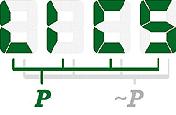Paper: Uniform proofs and disjunctive logic programming (at LICS 1995)
Authors: G. Nadathur D.W. LovelandAbstract
One formulation of the concept of logic programming is the notion of an abstract logic programming language. Central to its definition is a uniform proof, which enforces the requirements of inference direction, including goal-directedness, and the duality of readings, both declarative and procedural. We use this technology to investigate disjunctive logic programming (DLP), an extension of traditional logic programming that permits disjunctive program clauses. This extension has been considered by some to be inappropriately identified with logic programming because the indefinite reasoning introduced by disjunction violates the goal-oriented search directionality that is central to logic programming. We overcome this criticism by showing that the requirement of uniform provability can be realized in a logic which is more general than that of DLP under a modest, sound modification of programs. We use this observation to derive inference rules that capture the essential proof structure of InH-Prolog (Inheritance Near-Horn Prolog), a known proof procedure for DLP.
BibTeX
@InProceedings{NadathurLoveland-Uniformproofsanddis,
author = {G. Nadathur and D.W. Loveland},
title = {Uniform proofs and disjunctive logic programming},
booktitle = {Proceedings of the Tenth Annual IEEE Symp. on Logic in Computer Science, {LICS} 1995},
year = 1995,
editor = {Dexter Kozen},
month = {June},
pages = {148-155},
location = {San Diego, CA, USA},
publisher = {IEEE Computer Society Press}
}
